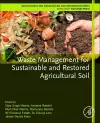
Waste Management for Sustainable and Restored Agricultural Soil
7 contributors - Paperback
£165.00
Vijay Singh Meena is Project Coordinator, Borlaug Institute for South Asia, and has worked in soil aggregation, carbon management index and carbon and nitrogen sequestration potential under climate resilient agriculture. He identified carbon management index as the key indicator to measure soil degradation in different agro-ecosystems. He also edited seven Springer books and three Elsevier books on microbes, organic farming and agricultural sustainability. He has received several scholarship and awards during his academic and professional career. Amitava Rakshit is a faculty member of the Department of Soil Science and Agricultural Chemistry at the Institute of Agricultural Sciences, Banaras Hindu University. His research areas include nutrient use efficiency, simulations modelling, organic farming, integrated nutrient management, and bioremediation. His consulting capabilities are composting techniques, soil health management, and input quality control. He is currently the Chief Editor of the International Journal of Agriculture Environment and Biotechnology. He is a member of the Global Forum on Food Security and Nutrition of FAO, Rome, and the Commission on Ecosystem Management of International Union for Conservation of Nature. Murli Dhar Meena worked on sustainable management of municipal solid waste, industrial waste and crop residues with enrichment of local sources of nutrients and use as an alternative of costly chemical fertilizers for maintaining soil health as well as improving crop productivity. He also developed low-cost organic fertilizers by using municipal solid waste and locally available low-grade sources of nutrients and make them available to plants through composting technology. Major findings are restoration of soil fertility by means of using organic sources of nutrients along with recommended dose of chemical fertilizers, nutrients availability as well as soil health and crop yield was significantly higher than alone use of costly chemical fertilizers. He developed low-cost organic amendments for reclamation of salt-affected soils as an alternative of chemical amendments. BASLAM Marouane is an Assistant Professor at the Department of Applied Biological Chemistry, Faculty of Agriculture, at the Niigata University (Niigata, Japan). He earned his PhD from Navarra University (Spain), followed by postodoctoral work at The Spanish National Research Council (CSIC, Spain). Dr Baslam’s first interest is to screen for new biostimulants/bioprotectors agents/compounds by exploring natural sources as new solution to change the future of agriculture and to ensure food security while preserving natural resources and providing business opportunities for farmers. He uses a wide range of cutting-edge biochemical, physiological, and genetic techniques to investigate plant-microorganism and plant-volatile compounds interactions. In addition, Dr Baslam investigates environmentally-friendly tools that secure improved crop performance, nutrient efficiency, quality/functionality, and yield stability under optimal and sub-optimal growing conditions (e.g., salinity, drought, nutrient deficiency and toxicity, heavy metal contaminations). He also explores potential contributions of the effect and the molecular and physiological mechanisms governing any increases in yield and/or quality/functionality. Dr. IMR Fattah is a postdoctoral fellow in the School of ISM, Faculty of Engineering and IT at the University of Technology Sydney where he is researching the effective use of waste for sustainable energy applications. His research interests stem from the Ph.D. in the combustion of renewable fuels completed at the University of New South Wales in 2019 where he focussed on the reduction of emissions (particularly PM/soot) from diesel combustion. He is actively engaged in the field by publishing over 50 articles and gaining over 4500 citations of his works. He is serving as an Editorial board member at Energies and managing three special issues as 'Guest Editor'. He has also peer-reviewed over 150 journal articles throughout his career. Dr. IMR Fattah would like to remain at the forefront of research in the field of renewable and sustainable energy. Prof. Lam holds a PhD in Chemical Engineering from Cambridge University, and is currently a Professor and the Deputy Director of International Centre of Universiti Malaysia Terengganu.He leads a research group working mainly on Chemical & Environmental Engineering, focusing on Waste & Biomass Utilization, Thermal Process (Pyrolysis, Gasification, Microwave Heating), Clean Technology. Lam is active in research on the application of pyrolysis and microwave heating in transforming waste and biomass into energy, green chemicals, valued-added products applicable to industry and environmental protection.He has secured 29 research grants, both international and in Malaysia, publishing over 230 papers, some of which are published in journals such as Lancet, Nature, Science, and Progress in Energy and Combustion Science, receiving a H-index of 43 and >5000 citations in Google Scholar, and file patent and commercialize inventions from his research team. Dr. Seutra is an Agronomist and an Agroforestry Researcher, lecturing at at the Faculty of Renewable Natural Resources, Kwame Nkrumah University of Science and Technology, Ghana. Dr Seutra has worked with both local and international Non-Government organizations on plant nutrition, crops management, climate change adaptation and mitigation strategies for farmers in Northern and Upper East Region of Ghana. My current research is focused on climate-smart soil management, integrated nutrient/soil fertility management, Climate change and Integrating Science with farmers’ knowledge.In addition, Dr. Seutra is a Certified Expert in Financing Nationally Determined Contributions (NDCs) from the Frankfurt School of Finance and Management, Germany with a career ambition to impact knowledge on students and make a significant mark in the lives of rural farmers, who depend on Agriculture as source of livelihood, by developing innovative and sustainable methods of improving crops yield.